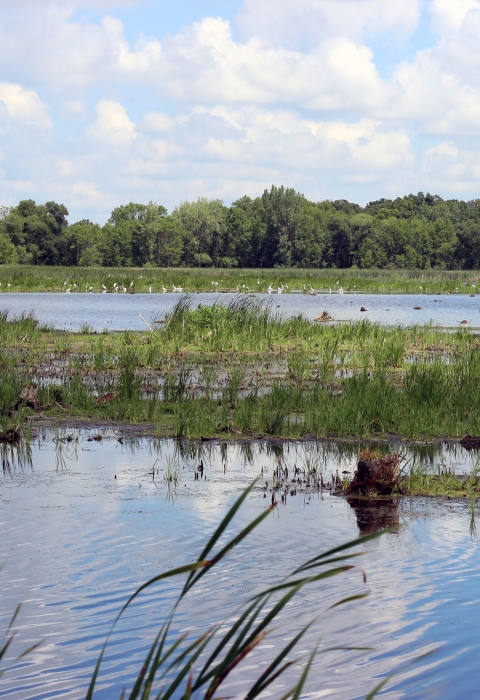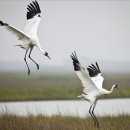Seasons of Wildlife
- Fall migration on the refuge offers impressive numbers of Canada geese, ducks and sandhill cranes.
- Spring migration offers a variety of unique waterbirds and songbirds and the sounds of frogs chorusing.
- Summer is nesting time at the marsh so wildlife is often less visible.
- Winter is a quiet time at the marsh but wildlife is still abundant including otters, muskrats, hawks, owls and coyotes.
2025 Fall Migration Surveys
9/17/2025
Total birds counted during survey - 15,853
Top Species Sighted by Bird Group
- Dabbler - Mallard - 3,618
- Diver - Ruddy duck - 7
- Geese - Canada goose - 779
- Marsh bird - American coot - 1,901
- Shorebird - Lesser yellowlegs - 79
- Swan - Trumpeter swan - 42
- Wading bird - Sandhill crane - 365
9/24/2025
Total birds counted during survey - 23,916
Top Species Sighted by Bird Group
- Dabbler - Mallard - 5,212
- Diver - Ruddy duck - 69
- Geese - Canada goose - 2,940
- Marsh bird - American coot - 3,245
- Shorebird - Lesser yellowlegs - 68
- Swan - Trumpeter swan - 38
Wading bird - Great egret - 132
__________________________________
2025 Spring Migration Surveys
3/13/2025
Total birds counted during survey - 5,902
Top Species Sighted by Bird Group
- Dabbler - Mallard - 656
- Diver - Lesser scaup - 397
- Geese - Canada goose - 2,039
- Marsh Bird - Ring-billed gull - 126
- Shorebird - Killdeer - 2
- Swan - Tundra swan - 83
- Wading Bird - Sandhill crane - 209
3/21/2025
Total birds counted during survey - 4,860
Top Species Sighted by Bird Group
- Dabbler - Mallard - 336
- Diver - Ring-necked duck - 574
- Geese - Canada goose - 2,366
- Marsh Bird - American coot - 149
- Shorebird - Killdeer - 2
- Swan - Trumpeter swan - 17
- Wading Bird - Sandhill crane - 41
3/28/2025
Total birds counted during survey - 22,143
Top Species Sighted by Bird Group
- Dabbler - Mallard - 918
- Diver - Ring-necked duck - 595
- Geese - Canada goose - 15,029
- Marsh Bird - American coot - 404
- Shorebird - Black-necked stilt - 2
- Swan - Trumpeter swan - 31
- Wading Bird - Sandhill crane - 8
4/4/2025
Total birds counted during survey - 12,952
Top Species Sighted by Bird Group
- Dabbler - Mallard - 1,403
- Diver - Lesser scaup - 1,144
- Geese - Canada goose - 4,989
- Marsh Bird - American coot - 1,224
- Swan - Trumpeter swan - 36
- Wading Bird - Sandhill crane - 16
4/11/2025
Total birds counted during survey - 22,430
Top Species Sighted by Bird Group
- Dabbler - Mallard - 553
- Diver - Lesser scaup - 714
- Geese - Canada goose - 18,344
- Marsh Bird - American coot - 2,785
- Shorebird - Lesser yellowlegs - 2
- Swan - Trumpeter swan - 15
- Wading bird - sandhill crane - 17
4/16/2025
Total birds counted during survey - 17,960
Top Species Sighted by Bird Group
- Dabbler - Green-winged teal - 907
- Diver - Ruddy duck - 2,449
- Geese - Canada goose - 6,886
- Marsh Bird - American coot - 3,060
- Shorebird - Wilson's snipe - 6
- Swan - Trumpeter swan - 26
- Wading Bird - Great egret - 9
4/23/2025
Total birds counted during survey - 8,652
Top Species Sighted by Bird Group
- Dabbler - Green-winged teal - 420
- Diver - Ruddy duck - 1,104
- Geese - Canada goose - 809
- Marsh Bird - American coot - 2,049
- Shorebird - Black-necked stilt - 20
- Swan - Trumpeter swan - 23
- Wading Bird - Great egret - 58
5/2/2025
Total birds counted during survey - 4,974
Top Species Sighted by Bird Group
- Dabbler - Blue-winged teal - 300
- Diver - Ruddy duck - 181
- Geese - Canada goose - 997
- Marsh Bird - American white pelican - 1,178
- Shorebird - Dunlin - 39
- Swan - Trumpeter swan - 17
- Wading Bird - Great egret - 30
5/7/2025
Total birds counted during survey - 4,597
Top Species Sighted by Bird Group
- Dabbler - Mallard - 345
- Diver - Redhead - 72
- Geese - Canada goose - 879
- Marsh Bird - American white pelican - 1,573
- Shorebird - Dunlin - 275
- Swan - Trumpeter swan - 18
- Wading Bird - Great egret - 56
END OF 2025 SPRING SURVEYS
Featured Species
The marsh provides critical habitat for more than 300 species of birds as well as muskrats, red foxes, turtles, frogs, bats, dragonflies, fish and much more.
Muskrat
Muskrats are often seen swimming or feeding on cattails and make their homes in cattail “huts” throughout the refuge. The original “marsh managers”, they create open areas of water for waterfowl to swim and feed.
Redhead duck
Originally established for this species, the refuge supports the largest nesting population of redhead ducks east of the Mississippi River. Thousands use the marsh each year.
American white pelican
American white pelicans nest abundantly on islands in the interior of the marsh and may be seen feeding in large groups - “herding” fish into shallower water for easier dining.








